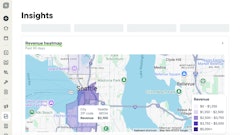
Lawn care is dominated by small businesses, and even the largest players in the industry have no more than five percent market share. This means that many customers continue to depend on local, small businesses for their lawn care needs—leaving ample opportunity for small business owners and sole proprietors to make a name for themselves.
Yet, failure is still a risk for small businesses in this sector, and 82 percent of these small businesses fail primarily due to one financial reason: cash flow.
Cash flow is king, but achieving it—and other critical financial needs—is difficult for the average small business owner without specialized support. Whether you’re a first-time entrepreneur looking to start your lawn care business off on the right foot or you’re a decadeslong small business owner who wants to make beneficial changes, consider the following tips for financial well-being.
Save time (and money) with automation.
We’ve heard from thousands of small business owners that many take at least one day out of their week to work on financial matters such as writing, sending and following up on invoices—time that could have otherwise been spent on the job and ultimately making more money. In some cases, a two-hour lawn care job might result in spending the same (or even twice as much) time to do the billing.
Instead of taking time away from operations, consider leveraging a banking partner who could help you automate these tasks for a far simpler invoicing process. With simple transactions and the option for digital reminders, customers tend to pay faster (an average of five days versus the traditional 27 days)—increasing cash flow and decreasing stress for owners.
Understand the different financing options at your disposal.
When cash flow becomes low, borrowing becomes necessary, but knowing when to use the right kind of financing is critical.
For one, a credit card can be a good source of financial support for your lawn care business, but it’s important to know when to use it. This is a great option when paying for gas for your fleets or other short-term needs, especially when your employees are the ones making purchases regularly.
For longer-term financing needs (especially those that extend beyond three months), loans are often the best option. That said, there are critical matters to consider. However, be very careful about the type of loan you take out, especially when it comes to risking your home. Many big banks offer home equity loans as an option to owners regardless of the size of their business, inadvertently leading many small businesses to see this as a viable option. In the long run, this only leads to a mountain of debt and their home being used as collateral.
Instead, better options for quick cash flow could include low-interest term loans or business lines of credit. With the right partner, both help support the continuation of your company’s operation, without putting you in a difficult financial situation.
Partner with financial institutions that understand your business.
Most big banks don’t care about the lawn care industry — especially given the smaller nature of many businesses in this space. And, with so many other larger commercial customers at stake, the big banks have less of an incentive to prioritize services that are tailored to niche small businesses. By aligning with a banking partner that is thoughtful in its offerings for small businesses specifically, owners can ensure cash flow remains high and debt remains low.
Following these pieces of advice can simplify financial matters, allowing owners to get back out on the green, doing what they know best and building their business.

















![Gravely Pro Turn Mach One My23 Dsc03139 Edit 1200x800 5b2df79[1]](https://img.greenindustrypros.com/mindful/acbm/workspaces/default/uploads/2025/10/gravely-pro-turn-mach-one-my23-dsc03139-edit-1200x800-5b2df791.BucBnDoN22.jpg?ar=16%3A9&auto=format%2Ccompress&fit=crop&h=135&q=70&w=240)

